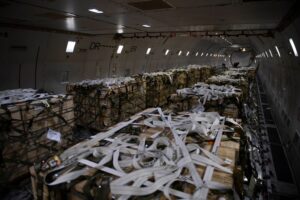The House Armed Services Committee is seeking regular briefings from the Pentagon updating Congress on progress replenishing stockpiles of critical munitions provided to Ukraine and efforts to sustain production capacity moving forward.
HASC’s markup of the fiscal year 2023 National Defense Authorization Act calls the department’s ability to restore inventories of systems such as Javelin and Stinger missiles a “a matter of major importance” and supports the continued delivery of such equipment to Ukraine, according to a copy of the bill obtained by Defense Daily
.

“It is the sense of Congress that the delivery of anti-tank and air defense missiles and munitions to Ukraine by the United States and numerous allies and partners around the world has had a crucial impact on the ability of Ukraine to resist Russia’s illegal invasion,” the committee writes in its bill. “It is vital to continue providing Ukraine with such assistance, as needed, in an appropriately rapid and sustained manner.”
The reports directed in the bill are intended to cover equipment inventory and production updates related to short-range air defense systems, loitering munitions, drones or ammunition provided to Ukraine, which follows concerns lawmakers have raised in recent months over the state of weapons stockpiles.
Specifically, the bill directs the secretary of defense to provide a quarterly briefing to Congress on the production capacity and current inventory for those systems provided to Ukraine, to include details on timeline and cost estimates for replenishing stockpiles and risks within the industrial base producing those weapons.
The briefings would also cover opportunities “to allow vendors to compete for agreements to produce next-generation short-range tactical missiles, launchers, fire controls, and any other supporting equipment” and “options to maximize competition” among those producing the systems, according to the bill.
The U.S. has sent approximately 1,400 Stingers and 6,500 Javelins to Ukraine to date, according to the Pentagon
William LaPlante, the Pentagon’s top acquisition official, has said the department’s intent is to eventually replenish stockpiles of equipment sent to Ukraine on a “one-to-one” basis, while noting that will likely require several funding efforts before production lines can reach that capacity (Defense Daily, May 6).
The markup also directs the Pentagon to provide quarterly briefings to the Congressional Armed Services and Foreign Relations Committees on replacing the stockpiles of U.S.-built capabilities that have been provided by allies and partners to Ukraine.
HASC notes in the bill that the Pentagon “responded effectively” to a letter committee leadership sent in March urging the department to establish a plan for replenishing the department’s stockpile of Stinger missiles that’ve been transferred to Ukraine and proposing furthering development of a potential new short range air defense (SHORAD) system (Defense Daily, March 18).
“The effort to replace existing stocks while prioritizing the rapid development of a low-cost, exportable evolution of a short-range air defense system should proceed as quickly and efficiently as possible,” the committee writes in its markup. “The Department of Defense should continue to develop and pursue this strategy while providing full transparency into its efforts to buy down strategic risk and engaging in substantial dialogue regarding the path forward.”
The Army is currently pursuing an effort to field a Stinger replacement after noting the current Stinger-Reprogrammable Microprocessor will become obsolete in FY ‘23, releasing a new Request for Information notice in April for the “Maneuver Short Range Air Defense Inc. 3” effort to find a Stinger replacement and detailing plans to begin developing and testing new capabilities next fiscal year before beginning production of 10,000 missiles in fiscal year 2027 (Defense Daily, April 11).
The Army in late May awarded Raytheon Technologies [RTX] a $624.6 million deal for procurement of Stingers, the company’s first production order for the anti-aircraft missiles since 2005 (Defense Daily, May 27).
On May 6, the Army awarded a $237.9 million deal for Javelin production to Lockheed Martin [LMT] and Raytheon, which jointly manufacture the anti-tank missile, which was then followed by another $71.4 million deal on May 12.
HASC is set to publicly release its version of the NDAA on June 19 and hold a full committee markup on June 22.